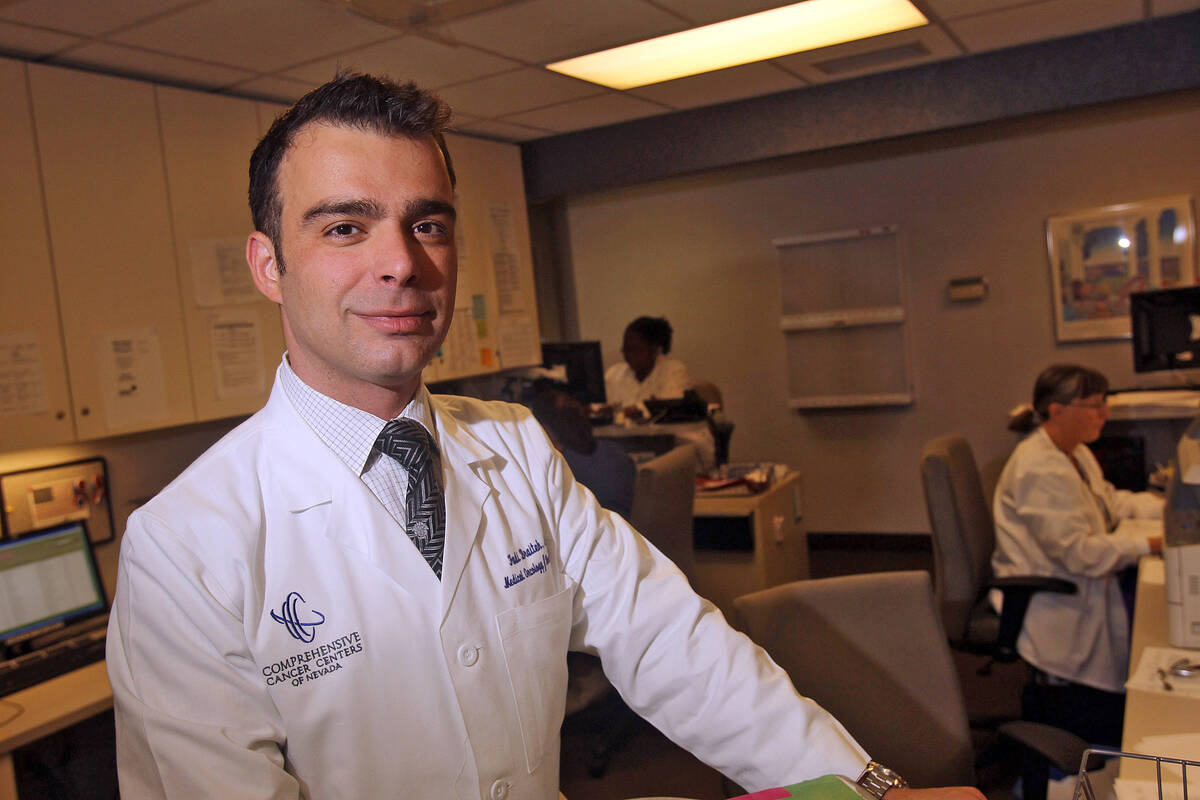Jewish group offers gene cancer testing for all

Dr. Fadi Braiteh of the Comprehensive Cancer Centers of Nevada wants women to know that breast cancer is curable.
With women doing early detection through self-examinations and mammograms, nine out of 10 women are diagnosed with early-stage breast cancer, according to Braiteh, a medical oncologist at the center.
“Breast cancer is scary to most people,” Braiteh said. “The C-word is scary. Nobody wants cancer. I just had a phone call from a friend’s mom diagnosed with breast cancer and they were crying. I said, ‘Hold on a second. That’s not the end of the world. It’s a journey we’re going to deal with.’ ”
Braiteh said the incidents of breast cancer have remained the same over the last decade-plus. What continues to change is the screening.
“Las Vegas is very good in that a majority of patients proceed with physical exams every year and with screening,” Braiteh said. “There are groups that are at a disadvantage, like undocumented immigrants and other patients with language and economic barriers. They do not go through those routines like everybody else.
“In some other areas, like in the Bronx, there’s a much higher socioeconomic gap and breast cancer has a tendency to present at advanced stages than higher than the 10 percent I mentioned. It could be 20 percent to 30 percent.”
Most of the time the cause of breast cancer isn’t known, Braiteh said. There are known risks such as the absence of breastfeeding and hormonal replacement therapy after menopause. The third is the inherited predisposition to breast cancer such as the one actress Angelina Jolie has, which means a higher risk for breast cancer earlier in life, he said. She had a preventive double mastectomy.
“That’s why we have genetic counseling,” Braiteh said.
If there is no family history, women should start getting yearly mammograms at 40, Braiteh said. If there is family history, women should start even earlier because they are at higher risk, he said. Women should talk with their doctors for guidance.
“Even men need to let their doctors know they are carriers of the gene mutation,” Braiteh said. “Knowing your family history is very important.”
There’s a group that’s promoting genetic screening in the wake of Breast Cancer Awareness Month.
JScreen, Jewish Nevada and Congregation Ner Tamid are offering discounted screening to identify more than 60 types of cancer genes.
The testing is normally $200, but the groups have raised funds to reduce the cost to $100 per person for the at-home saliva test.
It’s available at Jscreen.org by entering NEV50 at checkout.
Megan Weintraub, chief philanthropy officer at Jewish Nevada, said Ashkenazi Jews are at greater risk for breast cancer with a one in four chance compared to one in eight in the general population.
Weintraub said it was great timing to let Las Vegas residents know that the testing is available for anyone to access.
Breast cancer affects a younger population than other cancers. Prostate cancer, for example, has an average age of about 75. Pancreatic cancer is 71, and the average age of lung and colon cancer is 65. With breast cancer, the average age is in the 50s, he said.
“We have a lot of younger women with breast cancer, and especially those women with the inherited predisposition to cancer, are pretty young,” Braiteh said. “My youngest (patient) is in her 20s.”
But there’s a lot of fears other than dying from breast cancer such as worrying about body changes and the removal of their breasts. Even the loss of hair is a big stigma for women, Braiteh said.
“The IV in the arm or chest goes everywhere in the body,” he said. “All of the women lose their hair. Some of them lose it a bit less, but most of them lose it all. Not everybody loses eyebrows or eyelashes but even 20 percent lose those. It’s not all chemo that makes you lose your hair, but the common chemotherapy regimen used for breast cancer, especially in the early stages.”
Braiteh said younger women are concerned about the impact on their children. “They think about how much they are going to explain to them that mommy is going to go through treatment. You can’t hide it from the kids who think a loss of hair means a loss of mom.”
Wigs are a solution, but that’s not something you can hide either, Braiteh said. These women are active in the workforce and out in public, and hair is a crucial part of their appearance.
“They have more pressure to prove themselves so losing their hair makes their self-esteem go down and feel less competent,” Braiteh said. “In the bedroom, it’s an issue about the intimate relationship with the spouse or the significant other. In the bathroom looking in the mirror, it’s about self-esteem.”
None of that is something to dismiss as a health care provider, Braiteh said. The industry has been struggling with the issue for years.
Doctors can prescribe cranial prosthesis — the technical word for wig because insurance covers that. Over the years, the industry has been trying to find a way to reduce the exposure of hair follicles to the chemo by the cooling of the skull, Braiteh said.
“By cooling the scalp a lot, you can induce the blood vessels to restrict,” Braiteh said of a treatment known as cold cap. “Whenever your hands are cold, the blood vessels in the hands narrow and reduce the blood flow to that area.”
But that’s not covered by insurance.